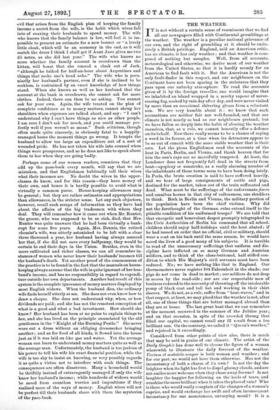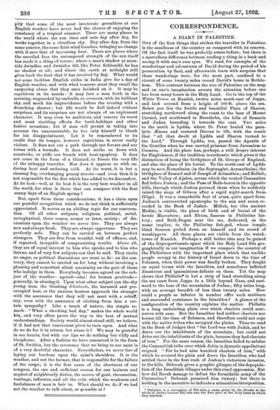THE WEATHER.
TT is not without a certain sense of resentment that we find
all our newspapers filled with Continental grumblings at the weather. The weather is a peculiar national grievance of our own, and the right of grumbling at it should be exclu- sively a British privilege. England, said an American critic, has no climate, it has only weather ; and that weather is com- posed of nothing but samples. Well, from all accounts, meteorological and otherwise, we derive most of our weather from the United States, so that it is hardly seemly for an American to find fault with it. But the American is not the only fault-finder in this respect, and our neighbours on the Continent have not been sparing in the strictures that they pass upon our unlucky atmosphere. To read the accounts given of it by the foreign traveller, one would imagine that we inhabited an island wrapped in a murky vapour of never- ceasing fog, soaked by rain day after day, and were never visited by more than an occasional shivering gleam from a reluctant sun. We are very humble about it : we know that such accusations are neither fair nor well-founded, and that our climate is not nearly so bad as our neighbours pretend; but we have fallen so deeply into the habit of abusing the weather ourselves, that, as a rule, we cannot honestly offer a defence on its behalf. Now there really seems to be a chance of saying a word in its favour, at a time when its detractors appear to be so out of conceit with the more stable weather that is their own. Let the pious Englishman read the accounts of the heat in Paris, Berlin, and Vienna, and thank heaven that for him the sun's rays are so mercifully tempered. At least, the Londoner does not frequently fall dead in the streets from heat—apoplexy or sunstroke, as a really alarming number of the inhabitants of these towns seem to have been doing lately. In Paris, the brute creation is said to have suffered heavily, and we hear of large consignments of cattle and pigs, destined for the market, taken out of the train suffocated and dead. What must be the sufferings of the unfortunate itacre and omnibus horses in that city of callousness, one shudders to think. Both in Berlin and Vienna, the military portion of the population have been the chief victims. Why did not the forethought of the German ruler extend itself to the pitiable condition of his uniformed troops ? We are told that that energetic and benevolent despot promptly telegraphed to the Civic Authorities of Berlin his command that all school- children should enjoy half-holidays until the heat abated ; if he had issued an order that no official, civil or military, should wear a coat on his back until the same season, he would have saved the lives of a good many of his subjects. It is terrible to read of the unnecessary sufferings that uniform and dis- cipline have inflicted on so many German and Austrian soldiers, and to think of the close-buttoned, half-stifled con- dition to which His Majesty's civil servants must have been reduced. No; we have nothing like that in England. Our thermometers never register 104 Fahrenheit in the shade; our pigs do not come in dead to market ; our soldiers do not drop in scores by the road-side ; nor are our respectable men of business reduced to the necessity of throwing off the intolerable pomp of black coat and tall hat and working in their shirt sleeves. We do not, as a rule, suffer from "heat-waves," and in that respect, at least, we may plead that the weather is not, after all, one of those things that are better managed abroad than they are at home. The last great heat that we can remember at the moment occurred in the summer of the Jubilee year; and on that occasion, in spite of the crowded throng that filled our capital, we cannot recall any ill result from a too brilliant sun. On the contrary, we called it "Queen's weather," and rejoiced in it exceedingly.
Considered from other points of view also, there is much that may be said in praise of our climate. The artist of the Daily Graphic has done well to choose the figure of a woman wherewith to illustrate the daily forecast of the weather.
Varian et mutabile seraper is both woman and weather ; and for our part, we would not have them otherwise. Has not the
inconstancy of both a charm of its own ? Is not the day the brighter when its light has first to dispel gloomy clouds, and are not smiles more welcome when they chase away frowns? Is not laughter the happier for following on the heels of tears, and sunshine t he more brilliant when it takes the place of rain? Who is there who would really complain of the changes of a woman's
caprice, and would exchange her swift and often inconsequent inconstancy for one monotonous, unvarying mood ? It is a
pity that some of the most inveterate grumblers at our English weather have never had the chance of enjoying the constancy of a tropical summer. There are many places in the world where the sun rises and sets day after day, for weeks together, in a cloudless sky. Day after day, from the same quarter, the same faint wind breathes, bringing no change with it save that of increasing heat. There are places where the unveiled face the nntempered strength of the sun itself has made it a thing of terror ; where a man's shadow at noon- tide dwindles and dwindles till, like Peter Schlemihl, he has no shadow at all ; and where the earth at midnight still gives back the heat that it has received by day. What would not some luckless English exiles in India give for a day of English weather, and with what remorse must they recall the unsparing abuse that they once lavished on it. It may be capricious in its moods : it may lure a man forth in the morning, unguarded by umbrella or overcoat, with its brilliant sky, and mock his improvidence before the evening with a drenching shower ; but life would be dull indeed without surprises, and its surprises are not always of an unpleasant character. It may even be malicious, and reserve its worst and most startling effects for bank-holidays and other festive occasions ; but if man will persist in taking into account the unaccountable, he has only himself to thank for his disappointment. Let it be remembered to its credit that its temper, however capricious, is never really violent. It does not cut a path through our forests and our towns with a tornado. It does not strike us down with sunstroke, or stifle our breath with heat-apoplexy. It does not come in the form of a blizzard, to freeze the very life of the unhappy traveller. Nor does it oppress us with en- during heat and enduring cold. At its worst, it is but a clammy fog, overhanging greasy streets—and even then it is not responsible for the dirt which has added to its discomfort. At its best—well, at its best it is the very best weather in all the world, for what is there that can compare with the first sunny days of an English spring ?
Bat, apart from these considerations, it has a claim upon our grateful recognition which we do not think is sufficiently appreciated. It serves as an abiding topic for our conversa- tion. Of all other subjects, religious, political, social, metaphysical, there comes, sooner or later, satiety ; of dis- cussions upon the weather we never tire. They are always new and always fresh. They are always opportune. They are perfectly safe. They can be carried on between perfect strangers. They are free from scandal, void of offence, and, if repeated, incapable of compromising results. Above all, they are of equal interest to him who speaks and to him who listens, and of very few subjects can that be said. They excite no anger, as political discussions are wont to do : on the con- trary, they cannot be carried on for long without involving a pleasing and somewhat silent unanimity on the part of those who indulge in them. Everybody becomes agreed on the sub- ject of the weather : agreed—alas ! for human gratitude— generally, in abusing it. Upon what other subject can the shy young man, the blushing debutante, the harassed and pre- occupied host, or the anxious hostess approach the stranger with the assurance that they will not meet with a rebuff, nay, even with the assurance of eliciting from him a cer- tain sympathy? Like a touch of nature, the simple re- mark: "What a shocking bad day," makes the whole world kin, and very often paves the way to the best of mutual understandings. Society would almost stand still, we believe, if it had not that convenient pivot to turn upon. And what do we do for it in return, but abuse it ? We may be grateful in our hearts, but with our lips we do nothing but vilify and blaspheme. After a fashion we have canonised it in the form of St. S within, but the reverence that we bring to our saint is of a very doubtful character. Nevertheless, we never tire of laying our burdens upon the saint's shoulders. It is the weather, and not the farmer, that is responsible for the failure of the crops ; it is the first cause of the shortness of our tempers, the one and sufficient reason for our laziness and neglect of neighbourly duties, the source of gout, rheumatism, lumbago, influenza, and all the evils which the weakness and foolishness of man is heir to. What should we do if we had not the weather to talk about, or giumble at ?



































 Previous page
Previous page